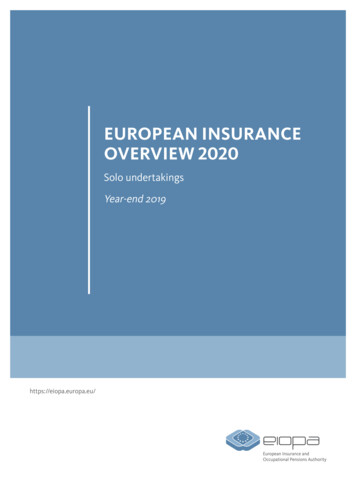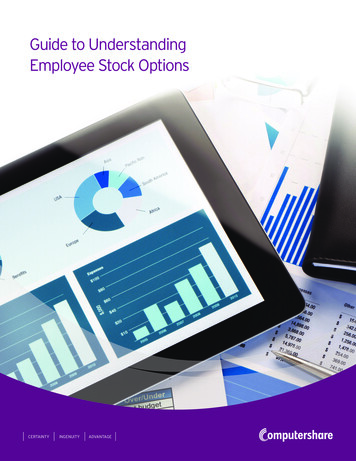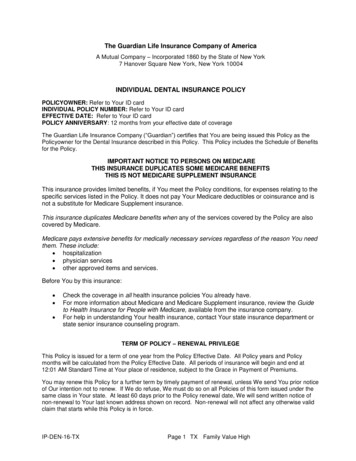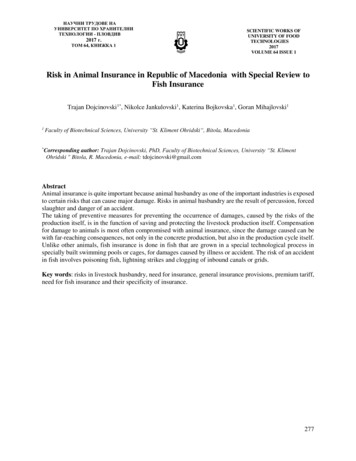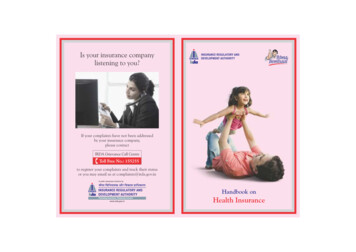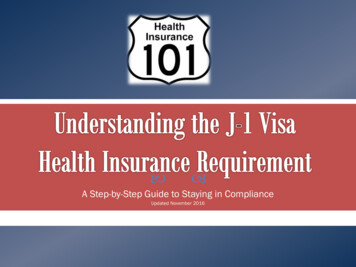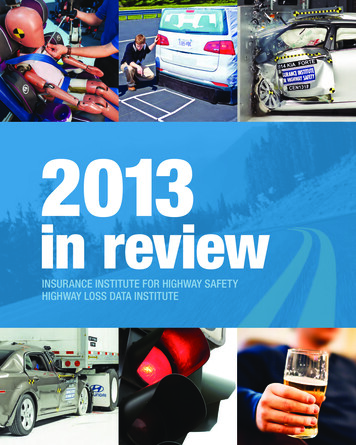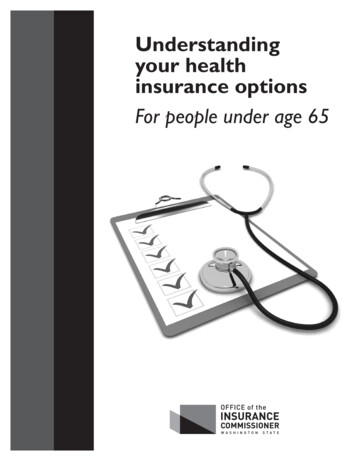
Transcription
Understandingyour healthinsurance optionsFor people under age 65
Understanding your health insurance optionsWhat kind of health insurance you need depends on your circumstances and finances. This publicationis designed to help you know your coverage options.Employment-related coverageThe most common way to get health insurance is through an employer. If you, your spouse, domesticpartner or parent (with adult children up to age 26) are currently employed, you might qualify for thefollowing types of health insurance plans:Group plansYour employer may offer health benefits for you, your spouse or domestic partner, and yourdependents. Group plans cannot reject you based on health problems. For coverage orinformation, check with your employer’s human resources department.Self-employedIf you’re self-employed, you may qualify for a small group plan if your business has at least oneemployee that isn't you or your spouse. You do not have to take a health questionnaire. However, youmust submit certain documents, like tax information, to show you have a bona fide business. Formore information, call our Insurance Consumer Hotline at 1-800-562-6900, or contact an insuranceagent, broker, or health insurer who sells in your area.Professional organizations and association plansSome professional organizations offer group health plans to members. You also may qualifyfor health insurance through a religious or fraternalorganization. Keep in mind that coverage may be limited.Review the plan carefully to make sure it meets your needs.Important tip:COBRA (Consolidated Omnibus Budget ReconciliationAct)This law requires employers with 20 or more full-timeemployees to extend health plan benefits to their employees(including spouses, domestic partners and dependents) wholose coverage under certain circumstances, such as if anemployee quits or loses his or her job. To find out more, callthe U.S. Department of Labor at 1-866-444-3272 or go ller employers with fewer than 20 full-time employees,church-related organizations and federal government plansare not required to offer COBRA coverage, but they mayoffer continuation coverage. Check your health plan’s benefitbook to see if you have a continuation coverage benefit.The “free look” periodWhen you receive your newpolicy, read it carefully. Everyindividual health care insurancepolicy sold has a 10-day “freelook” period. If you are notsatisfied for any reason, you mayreturn the policy to the companywithin 10 days after you receiveit. They will cancel the policy andprovide a full refund.Note: To ensure continuouscoverage, don’t cancel your policyuntil you’ve reviewed your newpolicy.
Buying a health plan on your ownHealth reform requires most people to have health insurance. If your employer doesn’t provide healthinsurance, you’ll need to buy your own individual health plan during the annual open enrollmentperiod. The good news is that if you’re under age 65 and don’t have insurance or you’re struggling topay for it, you may qualify for help to pay for some or all of your premium. In addition, health insurerscannot limit or deny you coverage if you have a pre-existing condition.When you can buy individual health insuranceYou can buy individual health plans during the following specific time periods (also called openenrollment periods): The open enrollment period to buy coverage for the 2017 plan year ended Jan. 31, 2017. If youmissed the deadline, you may qualify for a special enrollment period (see page 3). Washington Apple Health (Medicaid) enrollment is open all year long. Find out if you qualify orrenew your coverage through the Washington Healthplanfinder (www.wahealthplanfinder.org)or call 1-855-923-4633.Where to buy individual health insurance Through Washington Healthplanfinder (www.wahealthplanfinder.org) – An onlinemarketplace (also called the Exchange) where you can compare plans and get help paying yourpremium, depending on your household’s income. Directly from a health insurance company, agent or broker (www.insurance.wa.gov) –Additional health plans are available outside of Washington Healthplanfinder, but if you buydirectly from an insurance company, you won’t get help paying your premium.What determines how much you’ll pay in premiums Your age and the age of any family member on your plan Whether or not you smoke The size of your family (how many people you want to cover) Where you live The deductible amount The benefits in your health plan The amount of your IRS premium tax credit subsidy to help pay for your coverage if you applythrough Washington Healthplanfinder (www.wahealthplanfinder.org)Health care coverage for your adult children up to age 26Health reform requires your non-grandfathered group or individual health insurance plan to allow youthe option to keep or add your adult children, up to age 26, to your health insurance.
Individual health plan special enrollment periodsIf you have a qualifying event, you may get a special enrollment period to buy an individual healthplan. This means you can enroll in or change your health insurance plan outside the standard openenrollment period. Most special enrollment periods last 60 days from the date of the qualifying event(see below).Individual health plans - inside and outside the ExchangeQualifying events for special enrollment periods include, but aren't limited to: Losing your employer health plan Losing Apple Health (Medicaid) because you no longer qualify Giving birth to or adopting a child Permanently moving to a new area where your current plan doesn't provide coverage Employer not paying your COBRA premiums on time COBRA coverage period ending (usually 18 months) reaching the lifetime limit Your dependent turning age 26 and losing his or her coverage on your employer's plan Getting married or entering into a domestic partnership Getting divorced or ending a domestic partnership Canceling your Washington State Health Insurance Pool coverage Your health plan is no longer offered for sale in Washington stateIndividual health plans - only inside the ExchangeIn addition to the above qualifying events for special enrollment periods, if you buy a health planthrough the Exchange (www.wahealthplanfinder.org), one of the following may apply: You're a member of a federally recognized Indian Tribe or Alaska Native, then you may sign upor change plans within the Exchange once a month You can show the Exchange that your health insurer violated an important provision of itscontract with you, such as failing to pay claims for covered health care treatments You're denied or lose coverage due to errors or inaction by the Exchange You're denied or lose coverage due to errors, inaction or misconduct by enrollment assisters,such as an insurance company, agent or navigator You have exceptional circumstances that prevented you from enrolling, such as an illness, anatural disaster, or you're a domestic abuse victim and you weren't allowed to enroll separatelyfrom your spouse You or your dependent become a citizen, national, or obtain legal immigration status
You or your dependents have a change in income or household status that affects your eligibilityfor tax credits or cost-sharing reductions You permanently move into a new coverage area where you have access to additional healthplans You experience other changes in circumstances that affect your eligibility, such as you have achange in your employer health plan that makes it unaffordable or inadequate, or you're releasedfrom prisonNote: The Exchange and the U.S. Department of Health and Human Services have the authorityto create additional qualifying events for special enrollment periods. Contact the Exchange (www.wahealthplanfinder.org) for more information.You can also check out HealthCare.gov (www.healthcare.gov) for more information about specialenrollment periods.
Need more help?Visit our website at:www.insurance.wa.govor call our Insurance Consumer Hotline at:1-800-562-6900Our professional consumer advocates enforce insurance law and caninvestigate complaints against insurance companies and agents on yourbehalf. We also offer individual counseling and group education on healthcare issues in your communities. Our highly trained Statewide HealthInsurance Benefits Advisors (SHIBA) can help you understand your rightsand options about health care coverage, prescription drugs, governmentprograms, and more.The Insurance Consumer Hotline and www.insurance.wa.gov are free services providedby the Washington State Office of the Insurance g options 02-17
Understanding your health insurance options What kind of health insurance you need depends on your circumstances and finances. This publication is designed to help you know your coverage options. Employment-related coverage The most common way to get health insurance is through an employer. If you, your spouse, domestic
